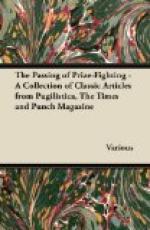Their Lives (STANLEY PAUL) has at least this point of originality, that it ends with the wedding of somebody other than the heroine, or rather, I should say, the chief heroine, because, strictly speaking, all three daughters of Mr. and Mrs. Radmall might be said jointly to fill this post, but it is Christina, the eldest, who fills most of it. The other two were named Virgilia and Orinthia, and I can’t say that these horrific labels did them any injustice. As for the story of “their lives,” as VIOLET HUNT tells it, there is really nothing very much to charm in a history of three disagreeable children developing into detestable young women. Perhaps it may have some value as a study of feminine adolescence, but I defy anyone to call the result attractive. Its chief incident, which is (not to mince matters) the attempted seduction by Christina of a middle-aged man, the father of one of her friends, mercifully comes to nothing. I like to believe that this sort of thing is as unusual as it is unpleasant. For the rest, the picture of the “artistic” household in which the children grew up, of their managing mother, and the slightly soured and disappointed painter their father, is drawn vividly enough. But what unamiable people they all are! “MILES IGNOTUS,” who supplies a quaintly attractive little preface, in which he speaks of having read the book in proof under shell-fire, affects to discover in them a kinship with Prussia. Certainly they are almost frightful enough.
* * * * *
Having read all about The Rise of Ledgar Dunstan (DUCKWORTH) from obscurity to wealth, literary success and aristocratic wedlock, I should be infinitely content to leave him at that and have done; but Mr. ALFRED TRESIDDER SHEPPARD warns us that there is more to follow, and even hints that the sequel, opening in July, 1914, may in many respects be far indeed from the dulness of happily-ever-after. If Ledgar had been satisfied to marry the sweetheart of his school-days there might have been some danger of such a disaster; but, having put his humble past, including his Nonconformist conscience, too diligently behind him for that, he will have to face whatever his author and the KAISER may have in store, supported only by a wife who is going, I trust and believe, to revenge on him all the irritation which she and I both felt at his attitude of unemotional superiority towards all the world. Some people may think it almost a pity that the lady cannot deal similarly with Mr. SHEPPARD himself in just reprisal for his long-winded and nebulous way of talking about Anti-Christ and Armageddon, and for his revolting incidents of murder and insanity introduced without any excuse of necessity. The book contains a considerable element of lively if undiscriminating humour, but its insistence on the gruesome is so unfortunate that unless his hero’s future fate be already irrevocably fixed in manuscript one would like to remind the author that essays in this kind are the easiest form of all literary effort and the least supportable.




